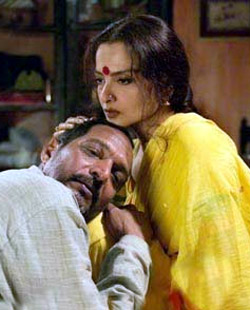Feb 07, 2026
Feb 07, 2026
Film: "Yatra"; Cast: Nana Patekar, Rekha, Deepti Naval and Nakul Vaid
Editor, Screenplaywriter, Cinematograper & Director: Gautam Ghose; Rating: **
 This is the story of a creator's journey. It could be seen as a metaphor of the fairly prolific director's own journey across the oscillating oceans of the motion picture. And never mind the rough patches and the debilitating turbulence.
This is the story of a creator's journey. It could be seen as a metaphor of the fairly prolific director's own journey across the oscillating oceans of the motion picture. And never mind the rough patches and the debilitating turbulence.
Gautam Ghose, who spearheaded the avant-garde movement in the cinema of the 1970s, has never been too comfortable with making films in Hindi, though he did make that masterpiece "Paar" - describing the metaphorical journey of an impoverished couple, played by Naseeruddin Shah and Shabana Azmi, across a river with a herd of pigs.
Piggish behaviour we see in plenty in Ghose's new Hindi film and some of it comes from the protagonist himself.
Dashrath Jogelkar (Nana Patekar) is one of those bull-headed writers who sees himself as a harbinger of socio-cultural change even as his own domestic domain disintegrates in front of his cynical eyes.
Many of Dashrath's responses to the world around him are so naïve in their apparentness you wonder if Ghose shares his protagonist's incredulity at the consumerist takeover of the middleclass or whether he would like to keep himself distanced from Dashrath's obstinate disregard for a social structure outside the domain of his imagination.
The ceaseless debate between the creative forces and the brute force of the reality outside the imagination is not fully harnessed in "Yatra".
In spite of some lucid camerawork (Ghose himself) there's an unfinished though fascinating aura to this modern somewhat suspended rendering of the Devdas tale shifted to a domesticated domain and driven by a cultural diversity that often borders on chaos.
In one sequence we hear Dashrath listening to classical music, his son (Romit Raaj) playing the drums, wife (Deepti Naval), a portrait of indignant docility, immersed in the kitchen sounds and the rain outside splashing in to the domestic din.
This is a quasi-gone-corny classic rendition of Ghose's treatise on cultural confoundedness as perceived through the eyes of a self-righteous creative artiste, who thinks the world isn't good enough to accommodate his fertile faculties.
This intriguing jigsaw about the life of the imagination moves through two cities Hyderabad and Delhi. The characters appear to belong to a no-man's land and the train journey that Dashrath takes with a filmmaker-fan (Nakul Vaid, hardly there) seems more symptomatic of the writer's inner perplexities than a manifestation of the journey that takes man from his imagination to an indeterminate spiritual destination.
Expectedly, Rekha provides the most inspiring moments, and not just for the besotted protagonist. Having played the doomed tawaif (prostitute) innumerable times, Rekha can do the fallen women act by heart. And she does.
There're some graphic scenes of sexual violence with an uncouth Hyderabadi zamindar, and a breakdown sequence at the end when Rekha pulls out all stops. Here's an actress for whom less is definitely more.
The rest of the cast including Nana, who has the author-'wracked' role, goes from profound emotion to keen disinterest.
There's an uneven quality to the narration, brought on partially by the proclivity to cram in a surplus of ideas on the moral and cultural downslide of a civilisation that has lost its balls and bearings.
Stagnancy is the underlying idea governing Ghose's hazily mystical journey across a mind that sees only anarchy around itself. There're moments of self-defeating social comment...
The sequence where Dashrath, the writer, imagines himself as suicidal farmer from Andhra Pradesh hanging from a tree (farm fatale!) diminishes the scope of the characters and their canvas into an amateurish morality tale.
And yet for all its creative failings there's no denying the power and strength of Ghose's ideological comment. The last lap of the journey, when the writer-protagonist vanishes from his social duties to spend time with the fallen woman, who is transformed over a period of time into an item girl, is like a cauldron of simmering ideas brought to a boil by a slow burn.
A more fast narrative and a less verbose style of presentation - the dialogues often border on pulpit polemics - would have gone a long way into making this journey more emblematic of the excursive enthusiasm of a creative mind than symptomatic of the malady that inflicts avant-garde filmmakers from the 1970s.
Ghose hasn't been able to make a smooth transition from anger and indignation to tolerance and introspection.
"Yatra" is "Paar" without the adventurous spirit or the metaphorical reverberations. Frigidity marks the rigidity of the creative artiste who dies in a kotha rather than at the doorstep of his family.
05-May-2007
More by : Subhash K. Jha